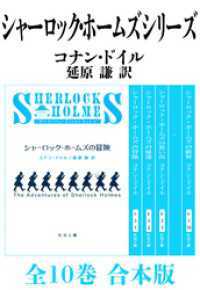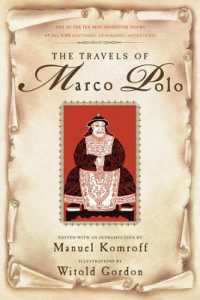- ホーム
- > 洋書
- > 英文書
- > Philosophy
Full Description
This book focuses on informed consent in African Traditional Medicine (ATM). ATM forms a large portion of the healthcare systems in Africa. WHO statistics show that as much as 80% of the population in Africa uses traditional medicine for primary health care. With such a large constituency, it follows that ATM and its practices should receive more attention in bioethics. By comparing the ethics of care approach with the ATM approach to Relational Autonomy In Consent (RAIC), the authors argue that the ATM focus on consent based on consensus constitutes a legitimate informed consent. This book is distinctive insofar as it employs the ethics of care as a hermeneutic to interpret ATM. The analysis examines the ethics of care movement in Western bioethics to explore its relational approach to informed consent. Additionally, this is the first known study that discusses healthcare ethics committees in ATM.
Contents
CHAPTER 1: INTRODUCTION: INFORMED CONSENT IN A COMMUNAL CULTURE.- 1.1. Dominant Cultural Perspectives of Informed Consent.- 1.2. Informed Consent in a Communal Culture.- 1.3. Focusing On ATM.- 1.4. Scope of the Study.- 1.5. Focusing on Ethics of Care.- 1.6. Focusing on Ethics Committee.- 2. CHAPTER TWO- HISTORICAL CONTEXT OF THE WESTERN BIOETHICS APPROACH TO AUTONOMY.- 2.1. History and Origin of Informed Consent.- 2.1.1. Legal Origin.- 2.1.2. Bioethical Origin.- 2.1.3. Reaction against Paternalism.- 2.2. Autonomy and Informed Consent.- 2.2.1. Meaning of Autonomy.- 2.2.2. Informed Consent and the Principle of Respect for Autonomy.- 2.2.3. Autonomy and Trust.- 2.3. The Concept of Person and Autonomy.- 2.3.1. Individual Independence.- 2.3.2. Reason as Opposed to Emotion.- 2.3.3. Individual Patient Rights.- 2.3.4. Individual Autonomy.- 2.3.5. Subjective Conception of the Good.- 2.4. Summary.- 3. CHAPTER THREE- SYSTEMATIC ANALYSIS OF ETHICS OF CARE.- 3.1. The History and Origin of Ethics of Care.- 3.1.1. Feminist Movement and Some Male Voices.- 3.1.2. Ethics of Care and Alternative Feminist Moral Theories.- 3.2. The Meaning of Ethics of Care.- 3.2.1. Care as Labor.- 3.2.2. Care as Practice and Value.- 3.2.3. Caring Relations.- 3.2.4. Care as Justice.- 3.2.5. Criticism of Ethics of Care.- 3.3. The Concept of Person and Autonomy.- 3.3.1. Relational Being, Family, and the Patient.- 3.3.1.1. Ethics of Care Critique of the Social Contract Theories.- 3.3.1.2. The Social Contract Theories.- 3.3.1.3. The Critique.- 3.3.2. The Ethics of Care Concept of Dependency and Interdependency of Persons and Human Existence.- 3.3.3. The Ethics of Care Concept of Relational Autonomy in Informed Consent (RAIC).- 3.3.4. Emotion as Essential Part of Human Nature in Moral Decision-Making.- 3.3.5. The Ethics of Care Concept of Individual Patient Rights.- 3.4. Summary.- 4. CHAPTER FOUR- COMPARATIVE ANALYSIS OF ATM WITH ETHICS OF CARE.- 4.1. An Overview of ATM.- 4.1.1.Meaning and History and Interesting Developments in ATM.- 4.1.1.1. Meaning and History of ATM.- 4.1.1.2. Interesting Developments in ATM.- 4.1.2. ATM and African Traditional Religion (ATR).- 4.1.2.1. African Traditional Religion (ATR).- 4.1.2.2. Community in Understanding ATM & ATR.- 4.1.3. ATM Doctors: Types, Vocation and Training.- 4.1.3.1. Diviners.- 4.1.3.2. Herbalists.- 4.1.3.3. Traditional birth attendants (TBA).- 4.1.3.4. Priests Healers.- 4.1.3.5. Traditional Surgeons.- 4.1.4. Health and Illness: the Need to Seek Healing.- 4.1.4.1. Concept of Health & Illness.- 4.1.4.2. The Need to Seek Healing.- 4.1.5. Decision-Making in Traditional African Societies.- 4.1.5.1. Decision-making among the Akan.- 4.1.5.2. Decision-making among the Hausa-Fulani.- 4.1.5.3. Decision-making among the Igbo.- 4.1.5.4. Decision-making among the Yoruba.- 4.1.5.5. Decision-Making and Women.- 4.2. The Concept of Person and Autonomy: ATM and Ethics of Care Contrasted.- 4.2.1. Relational Being: Individual (Patient) Versus Community.- 4.2.2. The African Concept of Dependency and Interdependency of Person and Human Existence.- 4.2.3. The African Concept of Relational Autonomy in Informed Consent (RAIC).- 4.2.4. Support for the Objective Concept of the (Common) Good.- 4.2.5. The African Concept of Individual Patient Rights.- 4.3. Summary.- 5. CHAPTER FIVE- APPLIED ANALYSIS OF ATM'S RAIC TO HEALTHCARE ETHICS COMMITTEES IN AFRICA.- 5.1. General Description of Healthcare Ethics Committees.- 5.2. Situation of Healthcare Ethics Committees in Africa.- 5.2.1. A Brief History of Ethics Committees in Africa.- 5.2.2. Healthcare Ethics Committees in Hospitals.- 5.2.3. Healthcare Ethics Committees in ATM.- 5.2.4. The Type of HEC Suitable for ATM.- 5.2.4.1. Being Organizationally Integrated.- 5.2.4.2. Being Proactive and Using Preventive Ethics.- 5.2.4.3. Ethical Leadership.- 5.2.4.4. Being Accountable.- 5.3. The Implications of Applying RAIC to Healthcare Ethics Committees in Africa onDecision-Making Process for Informed Consent of the Patient.- 5.3.1. Integration of Elements of Traditional Decision-Making Methods into Healthcare Ethics Committees.- 5.3.2. A Flexible Understanding of Confidentiality.- 5.3.3. A Nuanced Understanding of Advance Directive.- 5.3.4. Emphasis on Solidarity.- 5.4. Summary.- 6. CHAPTER SIX- CONCLUSION.- 6.1. Grand Summary.- 6.2. Contribution of the Book.- 6.3. RAIC and Global Bioethics.- BIBLIOGRAPHY.







